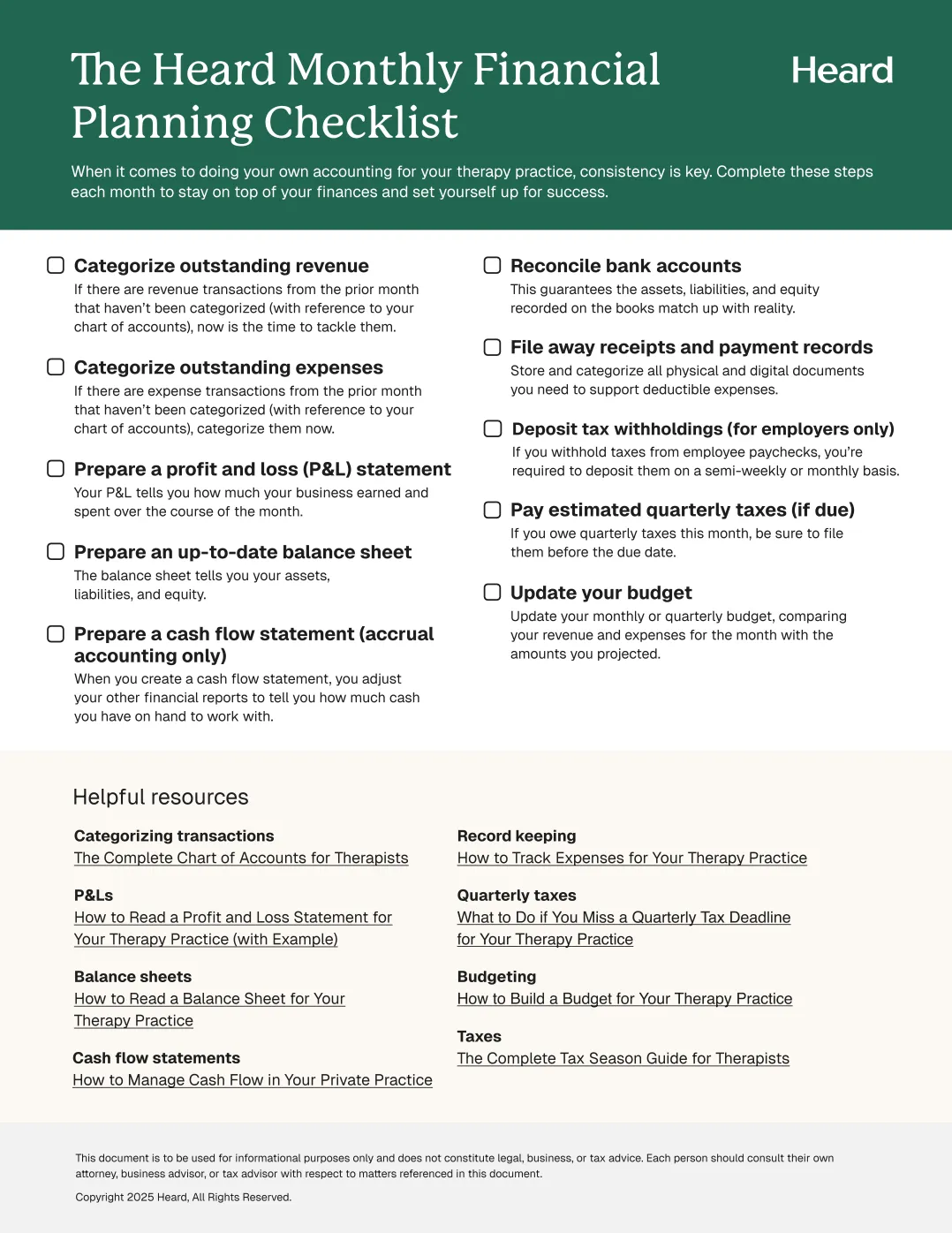After spending years gaining experience in the mental health industry, you're finally ready to build and grow your own private practice. But right out of the gates, you run into some common barriers to success.
How much should you charge for your services? How do you know if the fees you're setting are in that sweet spot between turning a profit and turning away potential clients? What expenses are absolutely necessary for your business operations?
Making business decisions as a mental health practitioner can be challenging. Odds are that grad school didn't teach you how to manage your practice finances, much less how to set goals in becoming profitable! Heard can help with that.
Here are four tips to increase the profitability of your private practice.
{{consult}}
Determine the right price of your service
Consider how many sessions you want to hold a week. Depending on your client load and how many hours you want to work a week, you can then determine how many total hours you will annually work (subtracting any amount of vacation) and play around with what you want to charge for your service.
Depending on where you live and your experience, service charges can vary widely and can sometimes be set on arbitrary fees. Our good friend and financial therapist Lindsay Bryan-Podvin examines some common themes and mistakes around setting your fees here.
Evaluate what feels personally right to you in terms of your weekly client load and how many sessions or hours you feel comfortable working. Once you have these factors dialed in, you can then calculate what an annual salary would look like. Be sure to account for any vacation time in your schedule.
Once you feel you have a reasonable service charge and subsequent salary calculated, add up your annual expenses and then comparing that with your salary. How much is left over? Are you comfortable with this salary? Are all of the expenses necessary? Have you accounted for licensure fees, retirement contributions, and traveling for workshops or seminars?
Many of these are self-discovering questions that you'll need to ask yourself in order to determine what feels right for you. There is no definitive correct answer to these questions. We advise to be flexible as your answers will likely iterate as you walk down the path of being a private practice therapist.
Invest time into marketing
Whether you are starting your own practice immediately after graduate school or perhaps after spending a couple of years working in a group practice, you'll likely start out working with a limited number of clients. Effectively growing this list of clients should be one of your top priorities to make sure your practice not only survives but thrives.
Dedicating a few hours each day to researching digital marketing, advertising, and promotional techniques will pay out quickly as clients are introduced to your services and reach out to schedule future appointments.
Some expenses will decrease as time goes on
Eventually as your private practice begins to establish itself, your clients may end up referring you. Better yet, you may hit your client limit, yet you still have individuals interested in working with you but no open space on your calendar. You're in demand!
Regardless, as your practice grows, your advertising, marketing, and promotional costs should decrease while you slowly start to recoup some of the estimated expenses for obtaining new clients. If you even have a client waiting list, you may decide to increase your base price depending on the service you provide per client.
Diversify the ways you earn business income
If you solely focus on client sessions, you will quickly reach an income ceiling that you may have a hard time breaking through. Get creative on other ways to earn income in the therapy field!
You may want to offer group wellness sessions or provide workshops for other therapists. If you want to focus less on group activities, you may write your own book centered around private practice, start your own blog, or contribute to an established blog as a guest author (we love to hire guest writers at Heard).
Perhaps you are a skilled candlemaker and as a side hobby you can sell them as a part of your practice! The ideas are limitless for passively earning additional income, but remember that your clients and their individual sessions will be making up the bulk of any income your business generates.
Though all of these factors must be tailored to your individual practice, these are just a few tips that may be able to help increase the profitability of your business. While profit is ultimately something you should strive for to run a successful practice, make sure to review the difference between profit and net cash flow to understand the financial wellbeing and scalability of your business!
—
This post is to be used for informational purposes only and does not constitute legal, business, or tax advice. Each person should consult their own attorney, business advisor, or tax advisor with respect to matters referenced in this post.
{{resource}}
Manage your bookkeeping, taxes, and payroll—all in one place.

Discover more. Get our newsletter.
Get free articles, guides, and tools developed by our experts to help you understand and manage your private practice finances.
Maximize your tax savings and build a profitable therapy practice with Heard. Book a free consult to learn more.
Schedule a free consult




